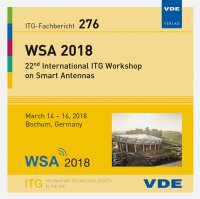Improving TCP Fairness over Latency Controlled 5G mmWave Communication Links
Konferenz: WSA 2018 - 22nd International ITG Workshop on Smart Antennas
14.03.2018 - 16.03.2018 in Bochum, Deutschland
Tagungsband: WSA 2018
Seiten: 8Sprache: EnglischTyp: PDF
Persönliche VDE-Mitglieder erhalten auf diesen Artikel 10% Rabatt
Autoren:
Pieska, Marcus; Kassler, Andreas J. (Department of Mathematics and Computer Science, Karlstad University, Karlstad, Sweden)
Lundqvist, Henrik; Cai, Tao (Huawei, Stockholm, Sweden)
Inhalt:
In order to increase the capacity of 5G networks, using mmWave band communication links both for access and backhaul are an important alternative due to the large spectrum portion available at those frequency bands. However, mmWave bands exhibit special propagation characteristics which require the usage of highly directional and beam-steerable antennas in order to cope with the significantly higher path loss. Using such links in urban scenarios may lead to frequent blocking events due to moving pedestrians or cars, which may result in the links dynamically changing their characteristics from Line-of-Sight (LOS) to Non Line-of- Sight (NLOS) or outage (OUT). Due to the immediate significant variation in available capacity when changing the link states, TCP connections may experience rapid spikes in end-to-end latency and severe bufferbloat may build up. Although bufferbloat solutions such as CoDel can be deployed to control the delay, they significantly impact capacity and fairness between different TCP flows sharing the same mmWave link. In this paper, we study this fairness issue when running multiple TCP connections over fluctuating mmWave links and deploying AQM schemes to control the latency. We study the effect of length and severity of the NLOS episode upon fairness and latency. Finally, we develop an algorithm that tunes the AQM parameters in order to increase fairness across flows having different RTTs while at the same time reduce their latency.


